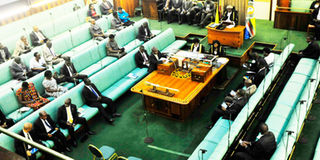Journalists without degrees barred from covering Parliament

Ugandan parliament has barred journalists without degrees from covering its proceedings.
KAMPALA
Journalists who have no university degrees will not be allowed to cover proceedings at parliament with effect from May.
A letter from the Parliamentary Commission to media houses in Uganda states that media practitioners who graduated in journalism, mass communication or a related field will be accredited to cover the 10th Parliament.
“…journalists who cover Parliament must meet certain minimum requirements,” a January 11 letter signed by Mr Okello Obabaru, on behalf of the Clerk to Parliament Jane Kibirige reads in part.
The directive adds that those who want to cover Parliament must have also practiced journalism for at least three years.
“They should be fair, accurate and balanced in their coverage of parliament’s proceedings," Obabaru says in the letter.
Just last year, the same Parliament sought to kick out journalists who had covered the House for over five years.
Parliamentary officials argued that many journalists were no longer objective, having covered Parliament for many years.
It claimed many had developed close ties with some politicians as news sources, and, thus, could not question their information.
According to some accounts, some senior journalists were accused of unfair coverage of Speaker Rebecca Kadaga.
She was accused of leaving fairly unpopular bills like the Public Order Management Bill, now an Act, to her deputy Jacob Oulanyah to handle.
The decision then to kick out the senior journalists led some observers to claim the speaker was disguising her resolve to punish particular reporters.
In any case, some editors argued it should be the media houses to decide who to send and withdraw from Parliament.
It is, say, after two years that some are deployed to Parliament as either reporters or photojournalists.
The speaker and the clerk later met some editors in Kampala and reportedly agreed to go slow on the expulsion of senior journalists.
Unlike the previous reasons given for wanting to bar reporters from the House, the current directive borrows from the Press and Journalist Act, 1995.
The Press and Journalist Act, 1995 proscribes one from practicing journalism if he or she does not have a valid practicing certificate.
It is the Media Council that issues the certificates to journalists who not only have the degrees but have also to pay registration fees.
According to this law, those who practice without a certificate are liable – upon conviction to a fine of Sh300, 000.
Should they fail to pay the fine, they serve for up to three months in jail.
Makerere University Law don Frederick Juuko has time after time argued that restricting the practice of journalism to people with degree certificates infringes on civil liberties, in particular the freedom of expression.
Yet others argue that having a degree certificate alone does not make one fair, accurate and balanced.
According to the new guidelines, Parliament will now be accrediting the journalists annually.
Currently, it accredits them once – at the beginning of each parliamentary term. The accreditation lasts for the term of Parliament – five years.



